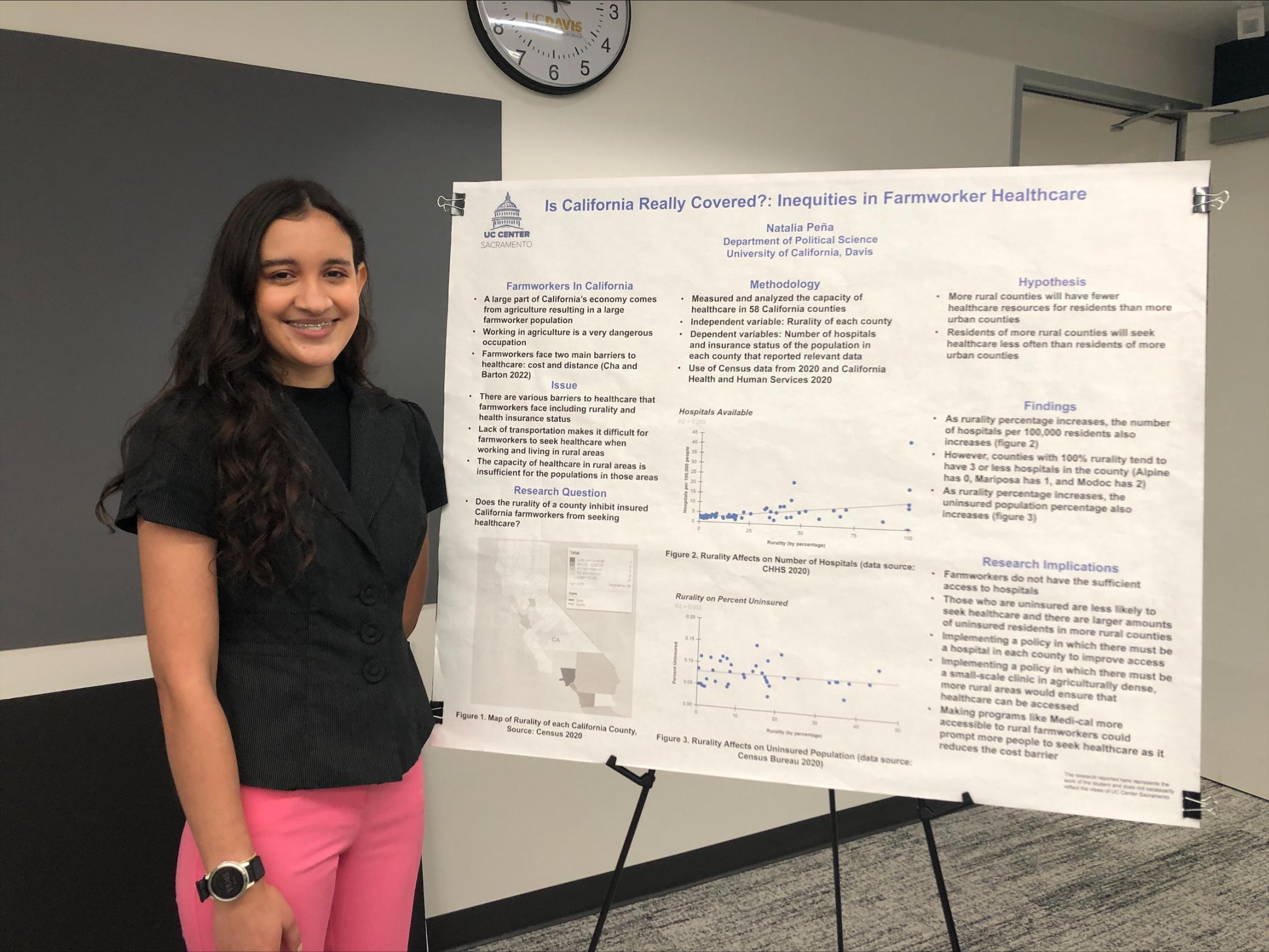
Do California’s farmworkers have access to health care? How does a community’s cost of living relate to its educational opportunities? Do university cultural support programs really support students?
Undergraduates from across the College of Letters and Science at UC Davis shared their research on these and many other pressing California policy issues in a fast-paced poster session at the UC Center Sacramento’s Undergraduate Research Showcase. The August 18, 2023 showcase included students from all nine University of California campuses who have spent the summer at UC Center Sacramento.
“Our curriculum in political science and other departments in the college gives students a strong foundation for following their interests in public policy,” said Ben Highton, professor and chair of political science in the College of Letters and Science at UC Davis. “It prepares them for a wide range of careers that have a real impact in the world.”
Digging into data to find problems and solutions
During their time at UC Center Sacramento, University of California undergraduate students receive training in statistical methods and tools that they then apply to real data. This could be large-scale health or poverty data or even data they compile from public sources.
Natalia Peña, a philosophy and psychology double major, wanted to find out whether California’s farmworkers had fair access to health care. The subject is personal for her. She grew up in a rural community in Bakersfield surrounded by farmworkers. Her grandparents were farmworkers.

With data on rural population density, the number of hospitals in each county and health insurance coverage, Peña found that farmworkers lack access to health care for two reasons. The first was distance to a hospital. The second was a lack of insurance.
“Work in agriculture is dangerous but people have a lot of barriers to health care,” said Peña. “It’s infuriating because our agriculture in the state comes from farmworkers and they can’t get health care.”
Alec Arnold, a political science and history double major, tested the relationships between a community’s cost of living and educational opportunity. He leveraged data from the California Poverty Measure, which includes the impact of social programs in the state paid for by the state income tax.
Arnold’s analysis found that California counties with the highest cost of living also provided the greatest educational opportunity. This also means that counties where it’s most affordable provide the least chance for mobility.
“Are we creating a divide?” said Arnold. “Are we creating generational barriers? California really needs to focus on affordable housing.”
Elaine Vera-Aguilera, a sociology major, explored if cultural programs at UC campuses truly do support diverse students and increase their overall satisfaction. She analyzed student survey and cultural program data from all nine UC campuses.
Vera-Aguilera tested the relationship between an index of quality across cultural programs and diverse student responses to a single question: do they feel they belong.

The analysis showed a clear relationship between the quantity and the quality of cultural resource programs and student satisfaction. The takeaway: the higher the quantity and quality, the more students felt like they belonged. UC Davis and UC Riverside scored highest, which Vera-Aguilera said was not surprising. Both campuses have the highest number of cultural resource programs across all UCs, and those programs ranked best in terms of quality.
“We should continue to fund cultural resource centers and even look to improve them,” said Vera-Aguilera.
Preparing future leaders
The poster session is the capstone of each student’s academic work during their time at UC Center Sacramento. Enrollment take place each quarter or semester and in the summer in a newly renovated space across the street from the State Capitol.
The program includes training in policy analysis combined with an internship with a policy-focused organization. All University of California undergraduates can apply.
The goal of the program is to create better-informed citizens and future public servants, said UC Center Sacramento director Richard Kravitz. A notable program alumnus is Josh Hoover, a current member of the California State Assembly representing Folsom.

“Some will seek out careers in public service, but all will be more informed about how to look at policy with a critical eye,” said Kravitz.
Photos by Alex Russell/UC Davis.
